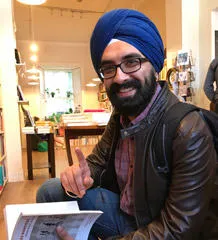Please note: this event has passed
Chair: Dr Mark Condos, Lecturer, War Studies Department
Speaker: Dr Gajendra Singh, Senior Lecturer in History at the University of Exeter
About the event
On 21 October 1914, William Charles Hopkinson was shot dead on the steps of a provincial courthouse in downtown Vancouver.
Hopkinson’s assassin, Mewa Singh, an Indian migrant was quickly tried and executed. It was a minor episode in the history of the Ghadar Movement – an attempt at an armed revolt against British rule in India by South Asian migrants in North America from November 1914.
Although it was a minor episode, Hopkinson’s role in it was not. Hopkinson was secretly a British Intelligence Agent who had partly created the transnational panic about Ghadar in British India, Canada and the United States while moonlighting as a Dominion Immigration Agent in Vancouver, a member of the white supremacist Asiatic Exclusion League in California and a trusted informant for Earl Grey, the Governor General of Canada.
This event will explore how Hopkinson can be used to seek understanding into the desperate neuroses that came to plague Britain, Canada and the United States in their desire to suppress, prosecute and execute members of Ghadar. The desire to prosecute a trans-regional and trans-Pacific conspiracy, about which they knew very little, resulted in Ghadar assuming a fictive, nightmarish quality in the Anglo-American imagination. And Hopkinson, in both life and death, helped to feed that fictive vision.
Speaker biography

Dr Gajendra Singh is Senior Lecturer in History at the University of Exeter. His research focuses on histories of colonialism in South Asia, with a particular focus on the hybrid, cosmopolitan nature of empire. He is the author of The Testimonies of Indian Soldiers and Two World Wars: Between Self and Sepoy (2014), which explored the wartime testimonies of Indian soldiers during the two World Wars, and is the co-editor of An Imperial World at War: the British Empire, 1939-1945 (2016). Dr Singh’s current research is about the anti-imperial, revolutionary Ghadar Movement during the First World War.
2022 marks the 60th anniversary of the founding of the Department of War Studies by Sir Michael Howard, and provides an important opportunity to both reflect and build upon his remarkable achievements and legacy. Sir Michael Howard’s greatest contribution to the history of war was his insistence on moving beyond the battlefield in order to examine the wider political and social contexts in which wars were fought. He also wrote about the legal, moral, and philosophical implications of war, and throughout his distinguished career sought to develop new approaches to understanding the impact of war on society.

